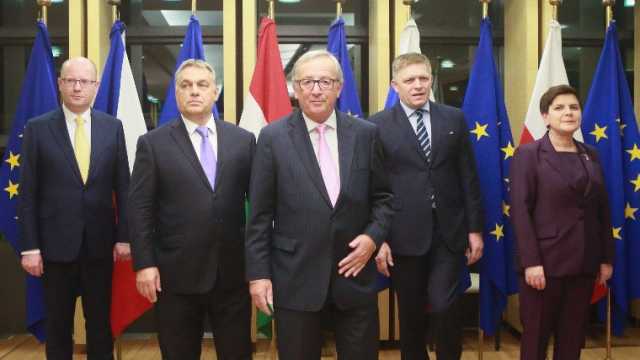Poland, Warsaw – The leaders of the Visegrád Group adopted on Thursday, March 2, a joint statement on their input to the Rome Declaration, which will be adopted at the summit in the Italian capital on March 25. They reject the idea of a two-tired Union, and want not “more or less Europe, but a better Europe”.
The four prime ministers met in Warsaw, capital of Poland – which currently leads the presidency of the V4 Group – and adopted a declaration called “Strong Europe – Union of Action and Trust”, which will be their input to the EU summit on March 25, held on the 60th anniversary of the Rome Treaty.
The Visegrád Four answered to Angela Merkel’s recent declarations about a “European Union with different speeds”, but also to Jean-Claude Juncker’s plans to create a special inner circle in Brussels.
The Visegrád group released statement read:
“The EU remains the best tool to face the challenges ahead of us. The values on which the EU was built, i.e. human dignity, free democracy, equality, the respect of human rights – hold their importance.
“The EU should remain open towards those countries that share these values, especially towards the Balkan nations and our Eastern neighbours.
“Ten years ago in Berlin we agreed to keep renewing the political shape of Europe, alongside the spirit of the times. History has proven that the EU is a live organism, which evolves and adapts.
“In order to regain trust, we must remain steadfast in the assurance that the European Union is capable of facing the expectations of member states and the needs of its people.”
The alliance also vowed to continue work on “external measures of migration polices” in the face of terrorism. It added:
“Citizens feel safe only when they are convinced they live in a place where full border control is guaranteed, and the right institutions have the necessary instruments at their disposal, to protect the people from danger.
“Over the space of the past few months we have undergone significant strides in terms of border safety in the EU. The time has come now, to return proper functionality to the Schengen zone. We have to make sure the free flow of people within the EU remains one of our greatest achievements, appreciated by the people. We must therefore continue to work on the external measures of migration policies, which were approved of in Malta.
“At the same time however, we believe there is work left to do in terms of cooperation around internal safety, aimed at protecting the lives of our citizens, mainly from the dangers of terrorism.”
The Visegrád Four also spoke out on their will to return powers to member states.
“The European Council must play a key role, setting major political objectives in particular, the European Council shall profoundly discuss issues of European agenda which are of major national interest to Member States”.
“We are witnessing the emergence of a new world order in which countries need to define their own place,” Viktor Orbán said. He added that the V4 statement would be instrumental in that self-determination. According to the Hungarian PM, countries have to keep the decision on important issues such as the setting of energy prices, migration, the independent tax system and strategies for job protection in their own hands.
Poland’s Prime Minister Beata Szydło said changes in the EU should not lead to “permanent cracks”. “Not ‘more or less Europe’, but a better Europe – this is the proposal of the Visegrad Group,” she told a news conference after the prime ministers’ meeting. She called on European Council President Donald Tusk, former prime minister of Poland and a political foe of its current ruling Law and Justice (PiS) party, to ensure that EU reforms are agreed before the Rome summit on March 25.
Slovakia’s Prime Minister Robert Fico said the state of preparations for the summit was “lamentable”.”It may happen that it will not be a vision of Europe for the future but a collection of individual, national interests which cannot help anyone today but can only do harm,” he told the news conference. The Visegrad leaders failed to come up with a common stance on whether to support Tusk in his bid for reappointment as the Council’s chief next week. Poland said on Tuesday it would oppose it. “There is no common stance as far as the Visegrad Group countries are concerned,” Czech Prime Minister Bohuslav Sobotka said at the news conference.
The group also agreed to prod Brussels to end “double standards” in food. Some firms use cheaper ingredients in food brands sold in Eastern Europe than in the West.
Slovak Prime Minister Robert Fico said if the European Commision did not act, Slovakia might trigger a public petition, which under EU law would force it to draft legislation.




